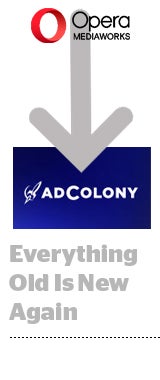 Will Kassoy is CEO of AdColony – again.
Will Kassoy is CEO of AdColony – again.
On Monday, Opera Mediaworks said it is changing its name to AdColony as of January. If the name’s familiar, that’s because it’s the mobile video ad network that Opera Mediaworks bought for around $350 million in 2014.
Kassoy was CEO of AdColony at the time, and then joined Opera Mediaworks as CMO, rising to the chief exec role in late 2015.
This year’s been a bit of a roller coaster ride for Opera Mediaworks.
In February, a consortium of Chinese companies placed a bid to buy it and its parent company, Opera Software, for $1.2 billion.
But the deal, which would have included Opera’s consumer-facing browser business and the Opera Mediaworks ad biz, hit a snag in July – reportedly a regulatory and privacy-related issue – and the consortium only ended up acquiring the browser business, and for half the original price.
Opera Mediaworks spun off from Opera Software into an independent public entity.
Despite the name change to AdColony, the company will continue to trade under Opera ASA on the Oslo Stock Exchange. Opera TV, BeMobi (Opera’s apps and games arm) and a few other bits and bobs – in other words, the stuff that didn’t get sold to the Chinese consortium – will remain nested under Opera ASA.
The public markets can be an awkward place for ad tech folks, but Kassoy said he’s encouraged by what he’s seeing, especially in light of The Trade Desk’s positive reception and AppNexus’s highly anticipated IPO.
“Valuations have increased for companies that add value to the ecosystem and there’s a growing trend around data science and AI, which is driving more consistency in the revenues,” he said. “That’s being rewarded over the old model, where ad tech companies lived IO to IO. It’s good to see the model shift more toward automation, data science and programmatic, and that’s also providing more predictability for investors.”
Before the spinoff, Mediaworks, now AdColony, was a big revenue driver for Opera ASA overall, and it’s still seeing growth as an independent company, reporting $122.1 million in Q3, up 26% year over year.
Although AdColony was originally known for its high-def mobile video products, the new entity’s scope will comprise mobile overall, including streaming video, rich media, mobile display and native, bolstered by increased investment in data science, AI and additional creative ad formats.
The goal is to start attracting more agencies and brand marketers with programmatic scale and ROI-centric metrics. At it stands, the company’s revenue is roughly evenly split between brand and performance clients.
“We’re bringing automation to the brand side of the business,” Kassoy said.
At the same time, the newly christened AdColony will be taking a close, hard look at its own stack, which is still far from fully integrated. Opera Mediaworks has more acquisitions than you can shake a stick at, including the original AdColony, AdMarvel, Mobile Theory, Apprupt, 4th Screen, Hunt Mobile Ads and Handster.
Over the past 12 months, the old Opera Mediaworks started streamlining to trim its headcount (which stands at about 800 now), tighten its infrastructure, unify its business units and consolidate its technology assets, with an eye on launching a more integrated ad platform, dubbed Apollo, in several phases throughout 2017.
AdColony redux will also focus on rolling out a series of more creative ad formats, including vertical video and interactive video, through its SDK, which it claims is installed in most of the top 1,000 apps.
And in terms of China, the company might even do a little business with the Chinese consortium that didn’t end up acquiring it. Kassoy wants to get “more aggressive” in the China market.
“We have a group of people there largely doing performance, but we’re looking to expand more to brands,” Kassoy said. “But if you want to do business in China, you need a lot of infrastructure over there – the tech needs to live in China. We’d be partnering with the consortium as a joint venture to take advantage of their capabilities and relationships.”













